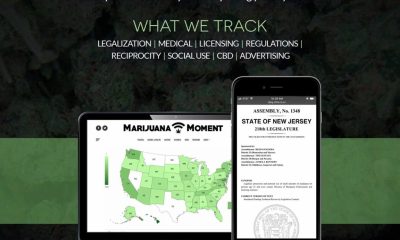Cannabis News
AI, Cannabis Knowledge, Venmo – How Stoners Can Make Bank in 2024 and Beyond!
Published
4 months agoon
By
admin

How Stoners can make Bank in 2024!
These days a buck barely buys half what it used to. Between inflation, greedflation, shrinking wages and bogus bans on workplace cannabis, making ends meet feels harder for the average stoner. entry-level grind feels fruitless just covering surging costs while careers waste potential behind outdated employment screens. Simply sustaining requires major money moves.
Fortunately, tech-savvy solutions suiting the modern stoner lifestyle abound. Whether needing some extra green or wanting to get out the corporate cube forever, practical paths await given the drive. Options transcending traditional jobs open doors for the cannabis inclined through location flexibility, passion pursuing, automation leveraging and underground economic participation now emerging in the light.
The key rests in taking action now rather than waiting for change. Because the emergence of crypto, AI and remote work combined with prohibition’s decline contain recipes for radical wealth creation at last checkable by the establishment. But we must first shake off limiting internal narratives that “getting ahead” demands dull conformity and begging gatekeepers.
The truth is rising costs pressure us to acknowledge skills and talents convertible outside boxes. Economic uncertainty kinds innovation; necessity guides us to recognize ways serving needs on our terms using tools instantly linkable to paying customers. This stands worlds apart from toiling hoping faceless corporations might throw raises to match inflation if we stay quiet.
Instead the new paradigm pays directly for digital services while aligned to higher callings, from coaching to blogging to advising and beyond. Stifled creativity finds outlets online daily as reform opens opportunities. So economic anxiety can give way to agency by applying weed-friendly abilities as micro-entrepreneurs and solopreneurs. Our yearnings supply the vision, technology the leverage. But first we must dare getting paid as our truest selves by those seeking it.
2023 set the stage for mass AI fascination, but 2024 shifts focus toward niche applications revolutionizing niche industries. Beyond generalized chatbots, we will see robust generative programs custom-built to replace entire professions with just one person’s specialized oversight. Suddenly solo entrepreneurs gain world-class skills instantly outperforming corporate teams.
Take book authorship – a novel writing assistant called “NovelCraft” helps fiction writers visualizing scenes, tracking character arcs across series, even theorizing fictional conversations on command. By offloading intense logistics, authors spend time bringing creative vision while AI handles heavy structuring. This hybrid approach allows artists crafting indeed masterpieces with minimal overhead.
And the costs prove reasonable for most – early pricing suggests such writing aids will run under $20 monthly. Compare that to traditional publishing requiring endless querying and revisions before eventual rejection. AI publishing frees creators sharing stories on their own terms.
When supplemented with other generative programs building out promotional graphics, book covers and recommended marketing prompts, a single author now commands a suite of talents mass distributing books directly to target audiences. This eliminates previous barriers like agonizing over writing quality or hiring teams to format, design and advertise.
The same formula applies for online education. Specialized tutoring AI helps craft personalized lesson plans then teaches students 1-on-1 tailored to their pacing and interests. Charging even $20 per customized session easily covers subscription costs to talent amplifying tech with income leftover.
Or on the graphic design front, AI image generators integrate seamlessly into workflow taking descriptive text and rendering gorgeous visual assets. This allows solo artists and media teams to exponentially boost output against corporate competitors still hand-drawing every element.
The common thread centers on leveraging emerging tech to unlock capacity and talents once completely inaccessible to individuals. Suddenly realization of any alluring idea or startup business rides less on mastering infinite skills but wisely applying combination templates to expediently transplant knowledge into service offerings.
So stoners can skip traditional jobs altogether by mixing passions with AI tools sculpting sellable solution spaces around them. Find needs wanting filling, utilize generative software custom fitting delivery, then profit simply bridging the gap. Freelancers configure writing aids penning SEO articles by the dozens monthly for clients or configure legal advising bots dispensing personalized case information to law firms.
The formula multiplies across infinite niches. Knowledge and creativity remain the sole constraints; technology now removes the majority limits on productive application. The equation shapes a marketplace of ideas accessible and sellable by any devoted dreamer. Where isolation and unchanged industries left minorities behind before, personalized AI ushers in tribes finding encouragement finally through voices unafraid targeting micro-markets corporate mammoths neglect.
With the right vision, AI allows monetizing almost anything by becoming intersection of passions, tech efficiency and customer pain points. Stoners might craft cannabis columns syndicated globally or captain virtual baking classes teaching grandma’s secret edibles.
While white-collar jobs bow to coming AI overlords, hands-on technical skills resist automation, ensuring endless demand. As predictions of robots replacing workers miss the mark on physical tasks, mundane careers offer major money moves surviving shifting economic eras. The world always needs tradespeople unclogging pipes, technicians troubleshooting machinery, builders constructing spaces. Thus as collars increasingly tighten for office-bound grads, trades guarantee sanctuary.
Consider plumbers, electricians, HVAC specialists – unglamorous roles where necessity cements job security. As infrastructure advances, devices demand greater expertise fixing inevitable failures beyond amateur inspection. And with handyperson wisdom fading across younger generations, supply shrivels for such mechanical crafts just as need compounds.
This proves the perfect storm for stoners sidestepping restrictive career gates keeping corporate ladders forever steep. Because unlike those office domains demanding conformity across conduct, appearance and political correctness, traits mattering little for practical technicians assigned clear measurable productivity goals. Show up, do good work, get paid.
Better pay too – Master electricians easily clear six figures directing teams, industrial welders match engineering salaries, and freelance contractors set rates drawing clients desperate just keeping daily life functional. Cannabis tests pose no issue when skill itself sells.
Moreover entering trades only requires affordable certification programs, apprenticeships or associate degrees – not endless Ivy League credential inflation. Prove hands capable at assigned technical tasks, develop speed/precision and income flows quickly sans six-figure student loan debt. Experience outweighs institutional deterrents.
Stoners might especially excel here through cannabis ingenuity boosting unconventional problem-solving. The type of out-the-box thinking institutions actively discourage. Trades reward resourcefulness and nuanced insights into failures necessary making things work. They keep infrastructure running, a noble task.
So for those disinterested desk jobs on one side yet intimidated high-tech on the other, look into skilled trades or specialized repair careers. As long as civilization becomes increasingly more complex technically, your talents find welcome homes. Tech breakthroughs never halt human needs for functioning homes, electricity, climate systems, robust networks. And hippie intuition Makes many master diagnosticians, able to feel out solutions logically-impaired robots cannot conceptualize. We all require water, warmth and sanitation. Stoners can provide as educated technicians.
Beyond pardons, stoners stuck with petty pot charges messing up work and money should look into clearing records. Even old misdemeanors create lifelong barriers once you “do your time”. Background checks spotlight old weed arrests limiting jobs or loans years later, no matter how you’ve changed.
But record sealing or expungement laws let some old charges get deleted if conditions met. It takes lawyer navigating, but maximizes odds clearing obstacles over dumb past mistakes.
Typically years after convictions, if parole terms met, people can petition courts to erase select cases from public record. Approved, expungement bans background screening companies reporting disposed stuff without your say. Checks ask about convictions? Mark “no” without old weed busts still haunting you or rescinding job offers later.
It ain’t easy though. Not all states have expungements, long exclusion lists after 2018’s First Step Act demand individual review, and standard denials happen.
But for petty, nonviolent possession misdemeanors, appeal chances are solid. Specially play up youth, work/school needs and staying clean. Pressure increases on courts to ditch old claims as more markets go legal and research piles up.
Serious trafficking charges probably won’t vanish quick though. But loser imprints like possession or paraphernalia cling-ons do screw rebuilding lives. And despite government bogeymen, such damage very much risks public safety by keeping people disadvantaged. Staying desperate with limited options.
So those moving past youthful cannabis charges shouldn’t endure lifelong punishment. Custom sealing provides paths clearing records to enable real economic participation rather than repeated obstacles.
In fact, strong expungement case pitches detail opened doors awaiting petitioners lacking only clean profiles. Tying ambitions to transparent civic duty sways some stubborn judges. More flies with honey and all.
With entry barriers dropping beyond strict federal contractor stuff, old Reefer Madness stigma proves the final hurdle. Why should minor pot charges from years back keep closing doors today on reformed citizens open to opportunity? The law allows rewriting stories; expungement completes the tale.
Next-gen tech now lets anyone profit from talents once solely owned by big dogs. Democratized access spreads as AI, automation and remote work crush barriers, letting solo entrepreneurs compete with corporate squads. Suddenly, restricted creators directly reach aligned fans instantly sharing offerings.
These leverage multipliers signal the rise of an ideas economy where passion and skill attract resources to build custom solutions for niche crowds. Cloud computing permits fast prototyping without fat infrastructure costs. Loving supporters discover you as accessibility tech bridges participation limits.
Basically the obstacles historically blocking small business ideas face systemic disruption through algorithms scaling modest ventures toward micro-multinationals. Where oppressive laws and social blocks once corralled minorities as spectators, now independent people form communities around unlocking mutual support and cosigns.
Technology welcomes excluded voices rather than censoring underrepresented perspectives. It spreads messages quickly, gaining critical mass through shared truths. Mass resonance overcomes traditional gatekeepers; solutions sell themselves by addressing unresolved needs.
So hopefuls should shift gears toward action before hesitation permits doubts killing initiative. Momentum favors first movers rather than perfect planners stuck spinning wheels afraid of unknown reception. Throw work out and let people show demand.
Every skill suits some lifestyle solution another will pay to get. Find the channels craving your creative flair then make passion a profession. Document your know-how teaching subscribers or design merchandise displaying your vision. This new wave lets you make bank from anything by aligning with niche crowds.
But first build it and they will come. The tools await your imagination’s instructions. Delays base only on belief in personal incapability, not system roadblocks holding you back. Market desire exists if you dare deliver the means of satisfying it. Fortune favors the bold builders rather than the watching. 2024 offers no excuses, only wide open empowered potential.
HOW TO MAKE MONEY IN WEED WITHOUT SELLING IT, READ ON…
You may like
-


Alabama Senator Calls State Medical Cannabis Commission A ‘Money Pit’ Amid Ongoing Litigation
-


Is Thailand about to Change Their Cannabis Laws Yet Again?
-


Does Lizzo Consume Weed – The Fresh Toast
-


Do Delta 8 Edibles Work For Female Arousal?
-


Could You Help Your Lips With CBD Balm
-


California Awards $12 Million In Local Cannabis Equity Grants To Repair Drug War Harms
Cannabis News
Is Thailand about to Change Their Cannabis Laws Yet Again?
Published
47 mins agoon
May 8, 2024By
admin

Thailand To Change Weed Laws Soon?
It’s Still Weed Paradise Right Now, So Go If You Can
Sure, weed is already legal in most of the United States.
However, for people who are in need of a holiday and want nothing to do but relax on a tropical Asian beach while enjoying a joint, the best place is still Thailand. Or at least, for now. Last June 2022, Thailand became the first nation in Asia to legalize marijuana for recreational purposes, albeit due to some governmental loopholes that allowed adult-use dispensaries to pop up like weed around the country.
Just a few days after weed was legalized, budding (pun intended!) entrepreneurs put up all kinds of weed shops and dispensaries. The smell of marijuana was soon prevalent all over, whether you were walking down a street in Bangkok or sunbathing in Phuket. These days, weed shops are as common as ATM machines or bubble tea kiosks.
We aren’t sure how long this is going to last. Over the last 1.5 years, throngs of tourists have come from all over the world to enjoy the globe’s newest weed haven. And while many cannabis businesses and farmers are thriving economically from the weed boom, some government officials are against it. As of the time of writing, the Thai government is working on regulating the cannabis industry much more tightly, so much so that smoking weed may not be such a liberal act to enjoy anymore.
Could Thailand’s weed heydays be this short-lived?
According to the news, Thailand’s health minister is set to ban recreational marijuana use completely by year end. A new bill is forecast to be discussed to parliament before session ends in October. Anutin Charnivakul, the public health minister responsible for initially proposing cannabis legalization, didn’t intend for weed to be as widely sold and consumed as it was. Instead, he explained that he merely intended for it to be used medicinally, helping farmers and other industries earn from the economic benefits of cannabis legalization.
“We have always emphasized using cannabis extractions and raw materials for medicinal purposes and for health,” he disclosed to CNN back in July 2022. “There has never once been a moment that we would think about advocating people to use cannabis in terms of recreation – or use it in a way that it could irritate others,” he added.
They likely did not anticipate or foresee that the tourism sector would experience a massive boom due to the said loopholes in cannabis law. Nobody knew that thousands of tourists would be coming from all over to enjoy partaking, and, helping to boost the tourist economy which was much-needed after the pandemic.
In a Reuters interview with Public Health Minister Dr. Cholnan Srikaew, he says that marijuana will only be permitted for medical use. Recreational users and cannabis growers who do not have a permit can expect to be charged with heavy fines, if the new bill is passed. “Under the new law, cannabis will be a controlled plant, so growing it would require permission. We will support cannabis cultivation for the medical and health industry,” he told Reuters.
The fines they are discussing are certainly steep: in the draft bill, it states that penalties of up to $1,690 can be charged to recreational users. Meanwhile, individuals who are caught selling weed or advertising its use can face a file of as much as $2,770, jail time, or even both.
The news to change Thailand’s once-ideal regulations regarding cannabis use was announced a few months ago, leaving businesses and other industries that are reliant on it, afraid and unable to make any plans for the future.
Can Tourists Still Smoke Weed In Thailand?
Until the government announces final changes to the weed law, tourists are still welcome to smoke weed and partake of recreational marijuana in various forms throughout the country. I just came from spending a few days in Bangkok, the nation’s capital, where hundreds of weed shops are still flourishing throughout the massive city.
Dispensaries are designed in fun, colorful interiors using bright colors and world-class marketing to attract smokers and consumers. We’ve walked into several different kinds of dispensaries and had no problems buying flower, edibles, vapes, and a variety of paraphernalia to consume either in the dispensary or in our hotel room. However, you do have to keep in mind that there are still rules in place.
For one, vaping or smoking weed in public places is still prohibited. Don’t be tempted to light up on the streets even if you can smell weed, because getting caught by the cops can lead to a $700 fine. That said, there are certain areas in Thailand where the law is a bit more – uh, relaxed. For example, in the backpacker central of Khao San Road, it’s not uncommon to see tourists lighting up at night. In the tourist beach areas of Krabi and Samui, there have been reports of tourists being able to easily light up a joint on the street with no problem.
Again, there’s no timeline of how long this is going to last. So if you can go to Thailand before the year end, when the new laws are expected to be set in place, go!
THAILAND AND LEGAL CANNABIS, READ ON..
Cannabis News
California Awards $12 Million In Local Cannabis Equity Grants To Repair Drug War Harms
Published
1 day agoon
May 7, 2024By
admin
California’s path to cannabis social equity: from arrests to advocacy
Data from the California Department of Justice reveals that nearly half a million individuals were arrested on cannabis charges in the state between 2006 and 2015. Even after Governor Schwarzenegger authorized a statewide decriminalization program in 2010, thousands continued to face serious misdemeanor charges related to cannabis. Despite California’s pioneering legalization of cannabis through Proposition 215 in 1996, just two years after the 1994 Crime Bill, the state legislature’s approach to cannabis legal reform was not as progressive as one might expect. The impact of the War on Drugs during this period was profound, with marijuana possession arrest rates increasing by 124% in 2010, even as rates for other serious crimes decreased significantly.
Proposition 64, passed a few years later, lacked any discussion addressing the damage caused by past policies. However, with social equity becoming a prominent topic in the cannabis industry, California officials have started investing significantly in social equity policies. Initiatives like the California Cannabis Equity Act of 2018 and the Budget Act of 2019 reflected this shift, aiming to support the economic development of communities and individuals adversely affected by previous harsh cannabis policies in what is now a multi-billion dollar industry.
Investing in justice: California’s cannabis social equity journey
In November 2023, California officials finally announced the application process for aspiring social equity business owners via the Cannabis Equity Grants Program for Local Jurisdictions which itself is an extension of Governor’s Office of Business and Economic Development. As the substantial costs of running a fully legal cannabis business in California can often get obscenely expensive, these large grants are meant to fund and lessen the financial burden of these exorbitant costs.
The overall purpose of this multi-million dollar initiative is “to advance economic justice for populations and communities impacted by cannabis prohibition and the War on Drugs by providing support to local jurisdictions as they promote equity in California and eliminate barriers to enter the newly regulated cannabis industry for equity program applicants and licensees,” according to the website. In February of 2023, the Governor’s Office of Business and Economic Development distributed approximately $15 million in social equity-focused funding to 16 different cities and counties throughout the Golden State.
Breaking barriers: California’s social equity initiatives in cannabis
At the end of last month, California officials finally awarded those patiently awaited funds. Funded by a $12 million portion of the billions in tax revenue raised by California cannabis sales, the grants will go to a total of 10 different cities and counties. While most awarded counties reside in Northern California, the city of Coachella also received $350,000 in funding. In particular, Oakland received $3 million and the city and county of San Francisco received over $2 million. “California’s cannabis industry is not just about business; it’s about righting past wrongs. Through initiatives like the Cannabis Equity Grants Program, the state is investing in communities once harmed by harsh drug policies, creating opportunities and economic justice for those affected,” said California Cannabis Attorney Karen Albence.
From prohibition to inclusion: California’s cannabis equity evolution
The possibilities with this funding are nearly endless. Funds will go towards local programs offering technical support, regulatory compliance and assistance. One notable grantee includes San Jose’s Cannabis Equity Business Academy. Social equity advocates have even more progress to celebrate, as the Governor’s Office of Business and Economic Development and Governor Gavin Newsom’s new budget proposal would invest $15 million further in similar programs by October of 2024.
Although it has taken a while for these programs to be created and even longer to be implemented, we are hopeful for this new era. This $12 million in local, social equity grants is a drop in the bucket, considering the damage that was done. But a drop is better than an empty bucket. With substantial investments and ongoing support, California is starting to pave the way for a more equitable and inclusive cannabis industry– one where all individuals, regardless of background, have the chance to participate and succeed. As the state continues to allocate resources and expand such programs, the future holds promise for further progress in achieving social equity within the California cannabis landscape.
Cannabis News
Patient Zero for Untreatable Depression Begins Groundbreaking Psychedelics Therapy
Published
1 day agoon
May 7, 2024By
admin

In a phase 2b clinical trial, Beckley Psytech has started treating the first subject for BPL-003, an intranasal synthetic formulation of the psychedelic chemical 5-MeO-DMT intended for patients with treatment-resistant depression.
With FDA clearance for investigational new medication status in February, this groundbreaking research represents the biggest controlled examination into the potential of 5-MeO-DMT, involving 40 locations throughout Australia, Europe, and the US.
The trial, employing a randomized, quadruple-masked design, seeks to identify optimal dosages of BPL-003, complemented by psychological support, in 225 individuals grappling with moderate to severe treatment-resistant depression, compared to a placebo group.
Efficacy will be gauged using the Montgomery-Asberg Depression Rating Scale at various intervals throughout the trial, with all participants receiving psychological support before, during, and after dosing. An open-label extension is slated for select sites eight weeks post-initial dosing to evaluate sustained effects following a second dose.
Anticipated findings from this phase 2b endeavor, projected by late 2024, will augment insights gleaned from the ongoing phase 2a exploration of BPL-003, as highlighted by the company.
Cosmo Feilding Mellen, CEO of Beckley Psytech, expressed confidence in the compound, citing promising safety and pharmacokinetic data. He emphasized its capacity to induce brief yet profound subjective experiences correlating with therapeutic benefits, underscoring the company’s eagerness to advance BPL-003 through the clinical development pipeline.
Unprecedented Research Scope
An important turning point in the field of psychedelic research, especially in the area of mental health therapy, was reached with the start of Beckley Psytech’s phase 2b clinical experiment. The large-scale nature of this experiment highlights an important development in our knowledge of the therapeutic potential of psychedelic substances, with a particular emphasis on 5-MeO-DMT for patients suffering from depression that does not respond to conventional therapy. This experiment, which spans 40 sites throughout Australia, Europe, and the US, is the biggest controlled investigation into the possible effectiveness of 5-MeO-DMT, in contrast to earlier research. This wide outreach guarantees a varied pool of participants and improves the trial’s outcomes dependability and generalizability.
A rising awareness among scientists of the need for novel strategies to tackle the widespread problems associated with treatment-resistant depression is reflected in the decision to launch such an extensive research project. Researchers want to increase the number of therapy choices available for those who have not reacted well to traditional medications by investigating the therapeutic benefits of 5-MeO-DMT in a rigorous clinical environment. The trial’s multi-site design also makes it easier for clinicians and researchers in various areas to collaborate, which promotes a group effort to further our understanding of psychedelic-assisted treatment.
The size of this phase 2b experiment not only emphasizes the significance of its findings, but also demonstrates Beckley Psytech’s dedication to pushing the limits of psychedelic research. Through strategic alliances and diligent preparation, the firm has proved its commitment to performing high-quality clinical studies that meet rigorous scientific criteria while investigating novel treatment approaches. This innovative method not only aids the area of mental health treatment, but also helps to de-stigmatize psychedelics by demonstrating their ability to treat significant psychiatric illnesses safely and responsibly.
The experiment is expected to yield valuable insights that might influence future research, clinical recommendations, and regulatory choices related to the use of psychedelic substances in mental health therapy. This is because the trial is expected to proceed and data will accrue. Psychedelic-assisted therapy is being promoted as a possible therapeutic option for the intricate problems associated with treatment-resistant depression, thanks to the combined efforts of researchers, physicians, and study participants.
Trial Design and Objectives
BPL-003’s phase 2b clinical trial has been carefully designed to assess the drug’s potential as a therapy for people with depression who are not responding to conventional treatments. The experiment uses a quadruple-masked, randomized design to reduce biases and guarantee the validity and dependability of the results. This methodological rigor bolsters the foundation for well-informed decision-making on developing BPL-003 and increases the legitimacy of the study’s findings.
Central to the trial’s objectives is the identification of optimal dosages of BPL-003 that can effectively alleviate symptoms of moderate to severe treatment-resistant depression. By employing a range of doses and comparing them against a placebo group, researchers seek to discern the therapeutic window within which BPL-003 demonstrates the greatest efficacy while minimizing adverse effects. This dose-finding aspect of the trial is crucial for informing subsequent clinical studies and eventual therapeutic use.
The experiment incorporates psychological support as an additional therapeutic component in addition to dose optimization. All patients get thorough psychological care before, during, and following medication since it is acknowledged that depression is a complex condition with psychosocial components that may influence treatment outcomes. To promote complete healing and recovery, this holistic approach emphasizes the need to address not only the biology but also the psychological and emotional elements of depression.
Furthermore, the trial’s design includes strong metrics for measuring effectiveness, particularly using the Montgomery-Asberg Depression Rating Scale at several points throughout the research. This validated method enables researchers to systematically assess changes in depression symptoms and track the therapeutic benefits of BPL-003 over time. The trial uses standardized evaluation techniques to improve the consistency and comparability of outcomes across multiple research sites, increasing the reliability and generalizability of the findings.
Evaluation Methods and Milestones
A wide range of evaluation techniques and milestones are included in the phase 2b clinical study to assess BPL-003’s effectiveness in treating depression that is resistant to therapy. The Montgomery-Asberg Depression Rating Scale, a reliable instrument for gauging depression symptoms and treatment response, is a key component of this evaluation. Researchers can systematically monitor changes in participants’ depressed symptoms and evaluate the therapeutic efficacy of BPL-003 in comparison to placebo by giving this scale to participants at different intervals during the experiment.
The study underlines the need to provide psychological support to all participants before, during, and after dosing. This integrated approach stresses the need to meet the holistic needs of patients receiving therapy while also recognizing the complex interplay between biological, psychological, and social factors in depression. The study’s purpose is to improve treatment outcomes and participants’ overall well-being by offering comprehensive psychological support, such as counseling and therapeutic sessions, during the experiment.
Furthermore, the trial includes an open-label extension phase at select sites, scheduled eight weeks post-initial dosing, to evaluate the sustained effects of BPL-003 following a second dose. This extension phase allows researchers to assess the durability of treatment response and investigate the potential for long-term therapeutic benefits. By extending the observation period beyond the initial dosing phase, the trial aims to provide insights into the maintenance of treatment effects over time and inform recommendations for the optimal dosing regimen of BPL-003 in clinical practice.
Bottom Line
Beckley Psytech’s phase 2b clinical trial of BPL-003 for treatment-resistant depression marks a significant milestone in psychedelic research. With its expansive scope, rigorous trial design, and emphasis on comprehensive evaluation methods, the study holds promise for advancing our understanding of psychedelic-assisted therapy. As the trial progresses and data accumulates, it is poised to provide valuable insights that could influence future treatment approaches and regulatory decisions in the field of mental health.
MUSHROOMS TO END DEPRESSION, READ ON…
Alabama Senator Calls State Medical Cannabis Commission A ‘Money Pit’ Amid Ongoing Litigation

Is Thailand about to Change Their Cannabis Laws Yet Again?

Does Lizzo Consume Weed – The Fresh Toast

Do Delta 8 Edibles Work For Female Arousal?

Could You Help Your Lips With CBD Balm

California Awards $12 Million In Local Cannabis Equity Grants To Repair Drug War Harms

Patient Zero for Untreatable Depression Begins Groundbreaking Psychedelics Therapy

What are the Benefits of Smoking Weed Through a Bong?

Mother’s Day weed gift guide 2024

Key Things To Know About Hemp And Marijuana Drinks

Distressed Cannabis Business Takeaways – Canna Law Blog™

United States: Alex Malyshev And Melinda Fellner Discuss The Intersection Of Tax And Cannabis In New Video Series – Part VI: Licensing (Video)

Drug Testing for Marijuana – The Joint Blog

What you Need to Know

Cannabis, alcohol firm SNDL loses CA$372.4 million in 2022

NCIA Write About Their Equity Scholarship Program

City Of Oakland Issues RFP For Employee Training Programs

It has been a wild news week – here’s how CBD and weed can help you relax

A new April 20 cannabis contest includes a $40,000 purse

UArizona launches online cannabis compliance online course
Trending
-

 Cannabis News1 year ago
Cannabis News1 year agoDistressed Cannabis Business Takeaways – Canna Law Blog™
-

 One-Hit Wonders1 year ago
One-Hit Wonders1 year agoUnited States: Alex Malyshev And Melinda Fellner Discuss The Intersection Of Tax And Cannabis In New Video Series – Part VI: Licensing (Video)
-

 drug testing5 months ago
drug testing5 months agoDrug Testing for Marijuana – The Joint Blog
-

 Cannabis 1011 year ago
Cannabis 1011 year agoWhat you Need to Know
-

 Marijuana Business Daily1 year ago
Marijuana Business Daily1 year agoCannabis, alcohol firm SNDL loses CA$372.4 million in 2022
-

 Education1 year ago
Education1 year agoNCIA Write About Their Equity Scholarship Program
-

 Education1 year ago
Education1 year agoCity Of Oakland Issues RFP For Employee Training Programs
-

 Cannabis1 year ago
Cannabis1 year agoIt has been a wild news week – here’s how CBD and weed can help you relax






